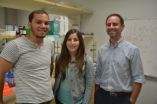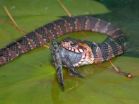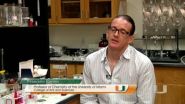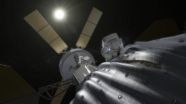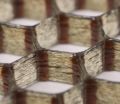(Press-News.org) Current guidelines to help prevent bloodstream infections during intravenous feeding may need
revisions to strengthen protections for patients, a new study finds.
Researchers at the United Kingdom's University of Southampton found that current guidelines do not account for other independent factors that can affect the growth of potentially deadly microorganisms. Their study was published today in the OnlineFirst version of the Journal of
Parenteral and Enteral Nutrition (JPEN), the research journal of the American Society for Parenteral and Enteral Nutrition (A.S.P.E.N.).
Existing guidelines restrict how long a single bag of parenteral nutrition (PN) containing lipids can be used due to the ability of lipids to encourage the growth of microorganisms. This study
looked at the growth of Escherichia coli (E coli) and Enterococcus durans (E durans) in PN to see if other factors can affect microbial growth.
The study found that additional factors, including glucose concentration, proportion of glucose to lipid, and osmolarity (concentration of a solution that can pass through the wall of a living cell through osmosis), can affect microbial growth apart from the presence of lipids.
The study's researchers recommend that these additional factors should be considered when making clinical and policy decisions to limit the potential growth of microorganisms in PN.
INFORMATION:
A publication of the American Society for Parenteral and Enteral Nutrition (A.S.P.E.N.), the Journal of Parenteral and Enteral Nutrition (JPEN) is the premier scientific journal of
nutrition and metabolic support. It publishes original, peer-reviewed studies that define the cutting edge of basic and clinical research in the field. It explores the science of optimizing the care of patients receiving enteral or intravenous therapies. All published JPEN articles are available online at http://pen.sagepub.com.
The American Society for Parenteral and Enteral Nutrition (A.S.P.E.N.) is dedicated to improving patient care by advancing the science and practice of nutrition support therapy and
metabolism. Founded in 1976, A.S.P.E.N. is an interdisciplinary organization whose members
are involved in the provision of clinical nutrition therapies, including parenteral and enteral
nutrition. With more than 6,000 members from around the world, A.S.P.E.N. is a community of
dietitians, nurses, nurse practitioners, pharmacists, physicians, scientists, students, and other health professionals from every facet of nutrition support clinical practice, research, and education. For more information about A.S.P.E.N., please visit http://www.nutritioncare.org.
Revisions needed for current IV feeding safeguards against bloodstream infections
2014-06-26
ELSE PRESS RELEASES FROM THIS DATE:
Researchers call for patients who receive home nutritional care to have emergency plans
2014-06-26
On the heels of the 2014 hurricane season, researchers are calling for home parenteral and enteral nutrition (HPEN) consumers and their homecare providers to have a comprehensive emergency preparedness plan (EPP) to ensure that special needs are met during the time of a disaster.
In a paper published today in the American Society for Parenteral and Enteral Nutrition's (A.S.P.E.N.) Nutrition in Clinical Practice journal, researchers with Coram Specialty Infusion Services outline the experiences of HPEN consumers and homecare providers in New Jersey affected by Hurricane ...
Researchers discover 'Trojan Horse' method of penetrating cellular walls without harm
2014-06-26
COLLEGE STATION – Scientists with Texas A&M AgriLife Research have found a "Trojan horse" way to deliver proteins into live human cells without damaging them.
The finding, published in this month's Nature Methods, is expected to be easily adopted for use in medical research to find cures and treatments for a wide range of diseases, according to the team's lead scientist, Dr. Jean-Philippe Pellois, an associate professor of biochemistry at Texas A&M University.
"This is something that for many years people have tried to do, because proteins are basic components of the ...
Invasive watersnakes introduced to California may pose risk to native species
2014-06-26
Watersnakes, commonly seen in the lakes, rivers and streams of the eastern United States, are invading California waterways and may pose a threat to native and endangered species in the state, according to a University of California, Davis, study.
While scientists do not know exactly how many watersnakes are in California, roughly 300 individuals of two different species –the common watersnake and the southern watersnake -- have been found in the Sacramento area (Roseville and Folsom), and at least 150 were seen in Long Beach. Researchers suspect the nonvenomous snakes ...
Sequencing efforts miss DNA crucial to bacteria's disease causing power
2014-06-26
Genomic sequencing is supposed to reveal the entire genetic makeup of an organism. For infectious disease specialists, the technology can be used to analyze a disease-causing bacterium to determine how much harm it is capable of causing and whether or not it will be resistant to antibiotics. But new research at Rockefeller University suggests that current sequencing protocols overlook crucial bits of information: isolated pieces of DNA floating outside the bacterial chromosome, the core of a cell's genetic material.
"Extensive sequencing of chromosomal DNA has been performed ...
A win-win-win solution for biofuel, climate, and biodiversity
2014-06-25
Fossil fuel emissions release billions of tons of carbon into the atmosphere each year, which is changing the climate and threatening the sustainability of life on planet Earth. In Brazil, the demand for alternative energy sources has led to an increase in biofuel crops. A new "News and Views" paper in Nature Climate Change, co-authored by Woods Hole Research Center scientists Marcia Macedo and Eric Davidson, reviews new research conducted by Brazilian colleagues demonstrating the high carbon costs of converting intact Brazilian savanna compared to the carbon gains obtained ...
Scientists develop a 'nanosubmarine' that delivers complementary molecules inside cells
2014-06-25
VIDEO:
Francisco Raymo discusses his work in this video.
Click here for more information.
CORAL GABLES, Fla. (June 25, 2014) — With the continuing need for very small devices in therapeutic applications, there is a growing demand for the development of nanoparticles that can transport and deliver drugs to target cells in the human body.
Recently, researchers created nanoparticles that under the right conditions, self-assemble – trapping complementary guest molecules within ...
NASA's STEREO maps much larger solar atmosphere than previously observed
2014-06-25
Surrounding the sun is a vast atmosphere of solar particles, through which magnetic fields swarm, solar flares erupt, and gigantic columns of material rise, fall and jostle each other around. Now, using NASA's Solar Terrestrial Relations Observatory, scientists have found that this atmosphere, called the corona, is even larger than thought, extending out some 5 million miles above the sun's surface -- the equivalent of 12 solar radii. This information has implications for NASA's upcoming Solar Probe Plus mission, due to launch in 2018 and go closer to the sun than any man-made ...
New NASA model gives glimpse into the invisible world of electric asteroids
2014-06-25
Space may appear empty -- a soundless vacuum, but it's not an absolute void. It flows with electric activity that is not visible to our eyes. NASA is developing plans to send humans to an asteroid, and wants to know more about the electrical environment explorers will encounter there.
A solar wind blown from the surface of the sun at about a million miles per hour flows around all solar system objects, forming swirling eddies and vortices in its wake. Magnetic fields carried by the solar wind warp, twist, and snap as they slam into the magnetic fields around other objects ...
Carbon-fiber epoxy honeycombs mimic the material performance of balsa wood
2014-06-25
Cambridge, Mass. – June 25, 2014 – In wind farms across North America and Europe, sleek turbines equipped with state-of-the-art technology convert wind energy into electric power. But tucked inside the blades of these feats of modern engineering is a decidedly low-tech core material: balsa wood.
Like other manufactured products that use sandwich panel construction to achieve a combination of light weight and strength, turbine blades contain carefully arrayed strips of balsa wood from Ecuador, which provides 95 percent of the world's supply.
For centuries, the fast-growing ...
Changes in forage fish abundance alter Atlantic cod distribution, affect fishery success
2014-06-25
A shift in the prey available to Atlantic cod in the Gulf of Maine that began nearly a decade ago contributed to the controversy that surrounded the 2011 assessment for this stock. A recent study of how this occurred may help fishery managers, scientists, and the industry understand and resolve apparent conflicts between assessment results and the experiences of the fishing industry.
When the dominant prey species of Atlantic cod changed from Atlantic herring to sand lance beginning in 2006, cod began to concentrate in a small area on Stellwagen Bank where they were easily ...
